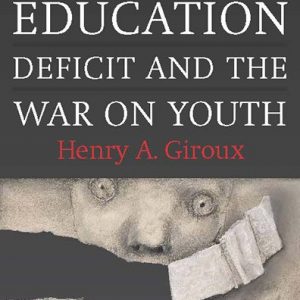BOOK REVIEW/Seth Sandronsky
Critical Thinking is At Risk
In “America’s Education Deficit and the War on Youth”, Henry A. Giroux focuses on the dysfunctional nature of US culture and politics (Monthly Review Press, 2013). Giroux offers an alternative to the corporate-teaching model prevailing in US K-12 schools now.
To this end, he analyzes mainstream assumptions and conclusions about the social purpose of education.
He terms our present moment as an era of “casino capitalism.” In this time of an ultra-rich minority calling the cultural and political shots, Giroux is a vital voice against corporate education reformers that talk progress for students and fund tests that restrict classroom curriculum and subvert critical thought.
Giroux and Diane Ravitch, former education official in the President Bush Sr. White House, concur on the pitfalls of the current corporate agenda to reform public schools with private dollars from the Gates Foundation, Eli and Edythe Broad Foundation, and Walton Family Foundation. More than Ravitch, though, Giroux hones in on public education as a counter to social stupefaction, and cultural and political dysfunction.
Both processes pervade US society, in and out of public schools. In brief, Giroux addresses a deficit of self-governance and its necessary conditions that threaten the future of today’s youth.
He writes: “At a time when critical thought has been flattened, it becomes imperative to develop a discourse of critique and possibility—one that recognizes that without an informed citizenry, collective struggle, and dynamic social movements, hope for a viable democratic future will slip out of reach.” As a radical cultural critic, Giroux analyzes and describes the how and why of a militarized culture of cruelty at home and abroad that recreates ageism, classism, racism and sexism.
To connect the material and mental dots this way makes Giroux a stranger to the corporate press. This pattern of exclusion demonstrates the ongoing relevance of Edward Herman and Noam Chomsky’s propaganda model in which mainstream news media filter out views that question orthodox thinking.
For Giroux, critical learning and teaching are the solutions to an assault against public learning and teaching, and the broader political democracy. Here, I find it noteworthy that he uses the term “democratization.”
Giroux follows Samir Amin, the African social scientist. His writing highlights the importance of democratization as a process of class struggle towards a post-capitalist order—as did Paulo Freire, a Brazilian philosopher who advanced his grassroots approach to learning and teaching…

Comments are closed.